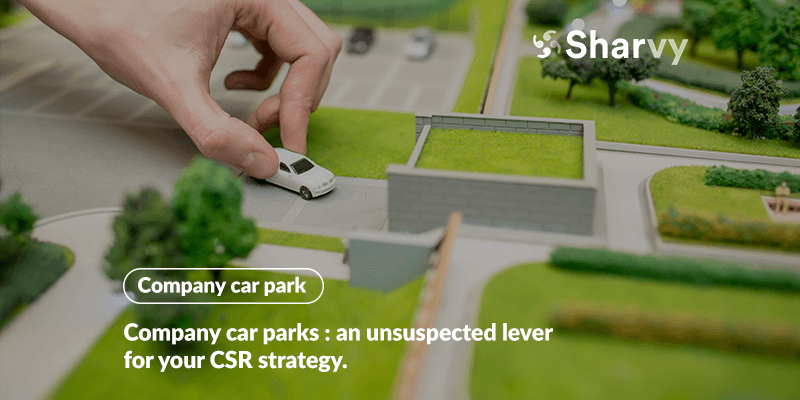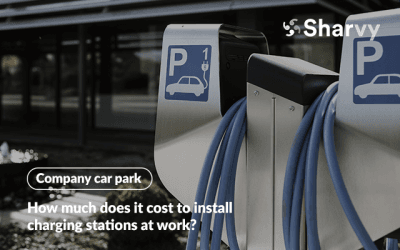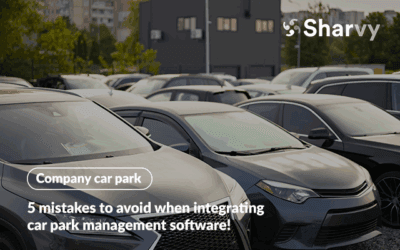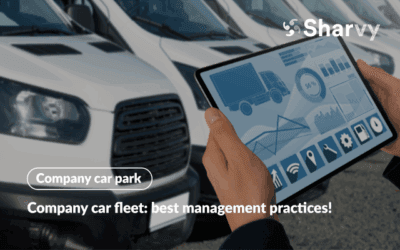Who would have thought that a company car park, often relegated to the status of an insignificant infrastructure « » , could play a central role in your CSR strategy?
By rethinking it, it is entirely possible to respond simultaneously to the three pillars of Corporate Social Responsibility: the environmental, social and economic pillars.
In this article, we’ll start by exploring the environmental aspect, showing how you can optimise your car park to reduce your company’s ecological footprint.
We will then look at the social pillar, highlighting the benefits for your employees, from soft mobility to collaborative services.
Finally, we will analyse the economic potential of these initiatives, demonstrating that a well-designed car park can also be profitable. So get ready to take a fresh look at this all-too-often neglected space.
A quick reminder : what is a CSR strategy?
A Corporate Social Responsibility (CSR ) strategy is a set of practices and commitments implemented by an organisation to integrate social, environmental and economic concerns into its activities.
It applies to all companies, whatever their size, business sector or geographical location.
However, companies (often) feel that it is difficult to commit to CSR because of a number of obstacles, both organisational and cultural: lack of resources, complexity of the process, priority given to other issues, lack of immediate visibility, etc.
In reality, committing to a CSR approach is not at all difficult: companies often have simple and accessible levers at their disposal that they are unaware of.
And contrary to popular belief that CSR requires heavy investment and complex transformations, it can start with pragmatic actions on existing aspects of the organisation.
For example : company car parks. Traditionally seen as a simple parking space, it has the potential to become a major lever for your company’s CSR strategy.
The hidden face of parking : why companies urgently need to take action?
When we think of parking, we often imagine a neutral, functional space. However, traditional car parks have a hidden face with serious environmental consequences.
On the one hand, the creation and maintenance of a car park contributes to the artificialisation of the land, destroying ecosystems and increasing urban heat islands. Add to that the emissions from cars circling to find a space, and it’s clear that these spaces are not as harmless as they seem.
Fortunately, sustainable alternatives are emerging. Green car parks, for example, incorporate areas of shade and greenery, reducing their impact on the local climate.
At the same time, some urban areas have introduced regulatory requirements, including incentives for the use of permeable pavements, the installation of sustainable water management systems, and the integration of vegetation to improve sanitation and reduce erosion.
In addition to these solutions, the hidden face of parking is naturally prompting companies to rethink their employees’ mobility habits, and to develop a more ecological, sustainable and environmentally-friendly car park.
These days, ideas abound for transforming a simple car park into a responsible, economically viable infrastructure that will enhance the well-being of your employees. Discover our ideas in the following sections!
CSR strategy : why optimising your company car park is essential for the environment?
There’s no doubt about it : your company car park can become a real lever for your CSR strategy. By reorganising it, you can reduce the environmental impact of your employees’ home-to-work journeys, encourage the adoption of more environmentally-friendly transport solutions, and above all meet new regulatory expectations. But how do you go about it? Here are 5 tips.
1. Design various spaces to accommodate soft mobility.
To encourage soft mobility in your company, start by creating secure areas for bikes and scooters, clearly marked out and equipped with racks for convenient parking.
If possible, install charging stations for electric bikes, accessible from the office, to promote this environmentally-friendly solution.
Finally, offer shelters to protect your staff from the elements, making these alternatives more attractive and practical.
These adjustments enable your company to go beyond the traditional « Car Policy » by adopting a global approach. What’s more, by rethinking your parking policy, you’ll be incorporating sustainable solutions in line with changes in society, regulations and technology.
2. Support your employees’ transition to electric vehicles.
Installing charging points in your company car park is more than just a formality. It’s a practical way of helping your teams make the transition to more responsible modes of transport.
By offering this convenience directly in your workplace, you’re making life easier for your employees while removing any concerns about battery life. You’re giving them a helping hand to take the step towards going electric, while affirming your company’s CSR values and strengthening its credibility with your partners.
To help you get started, read our advice in this White Paper!
3. Encourage car-sharing within your company.
Company car-sharing is a practical, user-friendly solution for reducing the carbon footprint of your employees’ daily journeys.
To make it a habit, start by offering a simple platform where your teams can connect and easily find colleagues sharing the same journey. You can also work with existing applications that specialise in carpooling.
As an extra incentive, reserve a few well-located parking spaces right next to the main entrance, exclusively for those who share their vehicle. This small gesture can (really) encourage the initiative.
And why not organise some fun campaigns, like a car-pooling challenge? Colleagues who get most involved could receive a reward, such as vouchers.
Solutions such as Sharvy, combined with the Karos application, make it easier to manage car-sharing : journeys are coordinated via Karos, while Sharvy automatically reserves a parking space for car-sharers, freeing up those of passengers for other employees.
This approach optimises the use of your car park while promoting more sustainable mobility and strengthening links within your teams.
To find out more, ask our teams for a demonstration!
4. Optimise the allocation and management of your tickets using connected solutions.
To support your CSR strategy, consider integrating intelligent technologies to manage your parking spaces more efficiently and sustainably.
For example, by equipping your car park with sensors and parking management software such as Sharvy, you can make it easy for employees to locate available spaces. This reduces search times, cuts unnecessary fuel consumption and reduces CO2 emissions.
In addition, you could reserve priority parking spaces for shared vehicles, such as electric vehicles, to promote these choices.
These connected solutions also provide invaluable data on parking habits, enabling you to adapt infrastructures to real needs & optimise the use of your car park.
5. Integrate your company car park into a multimodal strategy.
To go even further, think of your car park as a multimodal mobility hub. In partnership with local operators, install bike, scooter and electric car hire services directly in your car park.
Also encourage the use of public transport by arranging shuttle buses from nearby stations to your place of work. At the same time, and wherever possible, offer discounts on both train and bus passes.
There’s no doubt about it: by connecting your car park to a sustainable mobility ecosystem, you’re encouraging a transition towards more responsible habits, while increasing employee satisfaction.
NB : In addition to the company car park, Sharvy can help you manage the reservation slots for company shuttles. A specific module can be created in the application so that your employees can make reservations. This works exclusively on the FIFO model, in other words: first come, first served.
Company car parks, a social lever for improving well-being and working conditions.
Fair access to company car parks is an integral part of the social pillar of your CSR strategy, aimed at creating an inclusive and respectful working environment.
As you will have realised, although parking is often perceived as a simple logistical issue, it has a direct impact on the quality of life at work for your employees.
This is why, when parking spaces are unevenly distributed, it can create tension and a feeling of injustice among your teams. For example, certain parking spaces may be reserved for a restricted group of employees: directors, managers, visitors, etc.
On a day-to-day basis, this imbalance affects not only morale, but also the commitment of the teams involved. Those who have to spend long minutes each morning looking for a seat start their day in a state of stress, which can be detrimental to their productivity & general well-being.
By adopting a fair car park management policy, you are demonstrating that you take everyone’s needs into account, without favouring some over others.
You can easily define this policy using the Sharvy application, and thus strengthen the social pillar of your CSR strategy, while supporting a healthy & motivating working environment.
Company car parks, a social lever for improving well-being and working conditions.
By optimising existing spaces, in particular using a solution like Sharvy, you can increase the supply of parking without incurring the cost of new spaces. In particular, by sharing spaces (flex parking).
This efficient management also allows you to reduce or even eliminate the costs associated with renting additional spaces in neighbouring car parks. As was the case for our customer Onet! Click here to find out more.
What’s more, the installation of charging points for electric vehicles can be partially funded by public aid, helping to reduce the costs associated with the energy transition.
Finally, an optimised parking policy, supported by connected management technologies, reduces the time spent searching for parking spaces, which in turn increases productivity and reduces indirect operating costs.
There’s no doubt about it: these savings strengthen your company’s economic viability while promoting its environmental and social commitment.
In conclusion
Your company car park can become a real asset for your CSR strategy. By creating spaces for soft mobility, installing recharging points and encouraging the sharing of parking spaces, you can help to reduce your environmental footprint, while making life easier for your employees.
What’s more, optimised management also enables you to control your costs, by avoiding unnecessary expenditure such as extending & renting other parking spaces. By turning your car park into a CSR lever, you’re taking concrete action for a sustainable future while enhancing well-being in the workplace.
Have a question? Check out these FAQs !
Does teleworking have an impact on car park use, and indirectly on CSR strategy?
Absolutely. With teleworking, some spaces in your car park remain unoccupied, giving you a valuable opportunity to optimise their use. By implementing shared space management, you can increase the effective capacity of your car park without incurring additional costs for new infrastructure.
From a CSR point of view, this optimisation contributes to your economic pillar by avoiding costs linked to the construction and rental of new spaces. In addition, it supports the environmental pillar by reducing unnecessary journeys & encouraging solutions such as car-pooling or the use of soft mobility.
Finally, by simplifying access to parking, you are improving the well-being of your employees, thereby fulfilling the social pillar of your CSR strategy.
Can company car parks really help to achieve carbon footprint reduction targets?
Yes, company car parks can play a key role in reducing your carbon footprint. By providing infrastructure for electric vehicles, you can facilitate the energy transition and encourage your employees to adopt more environmentally-friendly modes of transport.
What’s more, by optimising the use of available spaces, in particular by encouraging car-pooling or using intelligent management solutions, you reduce the number of individual vehicles on the road, which in turn limits the emissions associated with commuting. These actions contribute directly to your carbon footprint reduction objectives.
Want to find out more? Check out our latest articles!
How much does it cost to install charging stations at work?
What is the real cost of installing charging stations in a business? How can you optimise your investment? Here are the answers!
5 mistakes to avoid when integrating car park management software!
What are the 5 most common mistakes to avoid before and during the integration of parking management software? Focus!
Company car fleet: best management practices!
Should you electrify, pool or automate your company car fleet? What are the best management practices? Let’s take a closer look!
Subscribe to our newsletter!
PARKING & WORKPLACE MANAGEMENT SOLUTION
Car park management - Charging points monitoring - Desk booking - Booking by time slots
SUBSCRIBE TO THE NEWSLETTER
Receive the latest Parking & Workplace trends by email once a month.













